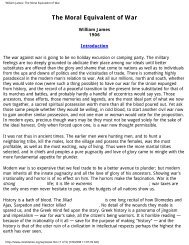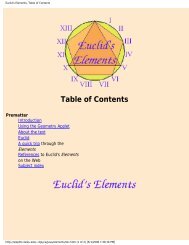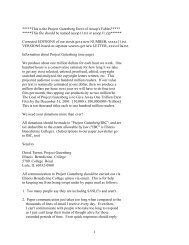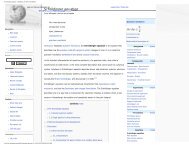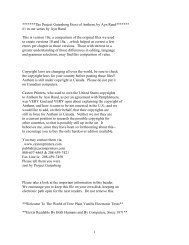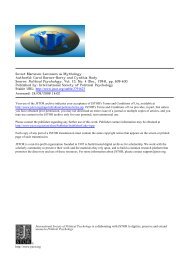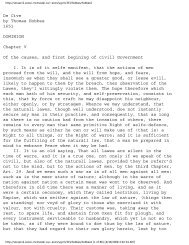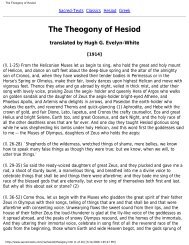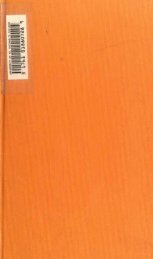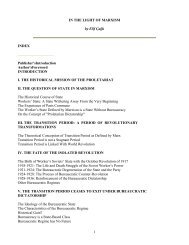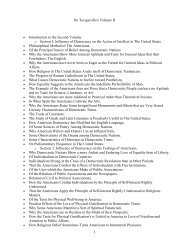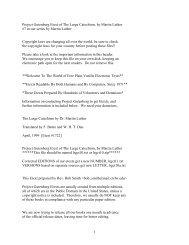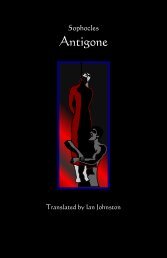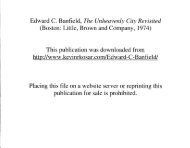Thomas Jefferson: A Manual of Parliamentary Practice
Thomas Jefferson: A Manual of Parliamentary Practice
Thomas Jefferson: A Manual of Parliamentary Practice
Create successful ePaper yourself
Turn your PDF publications into a flip-book with our unique Google optimized e-Paper software.
<strong>Thomas</strong> <strong>Jefferson</strong>: A <strong>Manual</strong> <strong>of</strong> <strong>Parliamentary</strong> <strong>Practice</strong><br />
Committee <strong>of</strong> the Whole, and the question will be, whether it shall be read a third<br />
time or, that it may be referred to a special committee.<br />
SEC. XXVI.<br />
BILLS, COMMITMENT.<br />
IF on motion and question it be decided that the bill shall be committed, it may then be<br />
moved to be referred to a committee <strong>of</strong> the whole House, or to a special committee. If the<br />
latter, the Speaker proceeds to name the committee. Any member also may name a single<br />
person, and the clerk is to write him down as <strong>of</strong> the committee. But the House have a<br />
controuling power over the names and number, if a question be moved against any one, and<br />
may in any case put in and put out whom they please.<br />
Those who take exceptions to some particulars in the bill are to be <strong>of</strong> the committee. But none<br />
who speak directly against the body <strong>of</strong> the bill. For he that would totally destroy, will not<br />
amend it. Hakew. 146. Town. coll. 208. D'Ewes. 623. col. 2 Scob 47. or as is said, 5 Grey<br />
145. the child is not to be put to a nurse that cares not for it. 6 Grey 373. It is therefore a<br />
constant rule "that no man is to be employed in any matter who has declared himself against<br />
it." And when any member who is against the bill hears himself named <strong>of</strong> its committee, he<br />
ought to ask to be excused. Thus March 7, 1606, Mr. Hadley was, on the question's being put,<br />
excused from being <strong>of</strong> a committee, declaring himself to be against the matter itself. Scob. 46.<br />
No bill shall be committed or amended until it shall have been twice read, after<br />
which it may be referred to a committee. Rule 14.<br />
All committees shall be appointed by ballot, and a plurality <strong>of</strong> voices shall make a<br />
choice. Rule 15.<br />
The clerk may deliver the bill to any member <strong>of</strong> the committee. Town. col. 138. But it is usual<br />
to deliver it to him who is first named.<br />
In some cases, the House has ordered a committee to withdraw immediately into the<br />
committee chamber, and act on, and bring back the bill, sitting the House. Scob. 48.<br />
A committee meets when, and where they please, if the House has not ordered time and place<br />
for them. 6 Grey 370. But they can only act when together, and not by separate consultation<br />
and consent; nothing being the report <strong>of</strong> the committee but what has been agreed to in<br />
committee actually assembled.<br />
A majority <strong>of</strong> the committee constitutes a quorum for business. Elsynge's Method <strong>of</strong><br />
passing Bills. 11.<br />
http://www.constitution.org/tj/tj-mpp.htm (28 <strong>of</strong> 70) [4/14/2008 6:37:46 PM]



